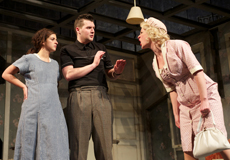This review was originally published on The University of Edinburgh’s Pre-Honours English Website:
http://www.literature.hss.ed.ac.uk/2013/01/review-a-taste-of-honey/
A Taste of Honey
Royal Lyceum, Edinburgh
****
When A Taste of Honey premiered in 1958 it became part of the revolutionary wave of British theatre (and later TV) known as ‘kitchen sink drama’, so-called because of its ordinary domestic settings and the everyday lives it portrayed. Written by Shelagh Delaney when she was just 18, the play tells the story of 17 year old Jo and her overbearing mother Helen as they linguistically wrestle with each other in the working-class heart of 1950s Salford.
Feisty, articulate Jo initially has to deal with her alcoholic and sexually promiscuous mother abandoning her to marry well-off but drunken idiot Peter. Jo then falls pregnant to black sailor Jimmy, who soon disappears from her life. She sets up home with her gay friend Geoff and they play at houses until Helen returns to dominate Jo’s life once more.
Tony Cownie’s production stars Rebecca Ryan, who plays Jo with a fierceness and vulnerability that is both funny and devastating. Her delivery is natural, the droll lines rolling off her tongue with a wonderfully musical Manchester twang. Loquacious, shouty and occasionally shrill, Ryan’s Jo is a fighter who, in better circumstances, would clearly have made something of herself.
Lucy Black as Helen is equally brilliant: caustic, bitter, glamorous and garrulous, as funny as she is infuriating. Both Jo and Helen typify the sort of strong, Northern women who roll up their sleeves and get on with it, no matter how dire their circumstances. The fiery banter tossed between the pair is one of the best things about the play: there is hatred there, but also love, no matter how poorly that love is demonstrated.
Charlie Ryan is lovely as sweet, sensitive Geoff; kind, nurturing and ‘big sisterly’, but essentially too meek to make any real difference to Jo’s predicament. Keith Fleming deftly portrays amusing but sinister chancer Peter, and Adrian Decosta is beguiling as Jimmy.
Janet Bird’s incredible revolving set is at once naturalistic and strangely dream-like, a grubby bedsit complete with ageing furniture, faded wallpaper and an industrial-looking backdrop that immediately contextualises the action.
In 1958, issues of race and homosexuality were shocking. Being an unwed mother with a mixed race baby could have rendered Jo a social outcast, and being gay was illegal in England until 1967. Obviously, a lot has changed. We’re no longer shocked by these things; they are part of the tapestry of British life. So does the play still have something to offer in 2013?
It certainly does. The humour and the interplay between Jo and Helen are timeless. The school pupils in the audience were laughing as much as everyone else, a good indication of how spot-on Delaney’s script remains and how entertaining the performances are.
It’s a play worth revisiting, no matter how much Britain’s social climate may have changed, and this is a production well worth investing in.


